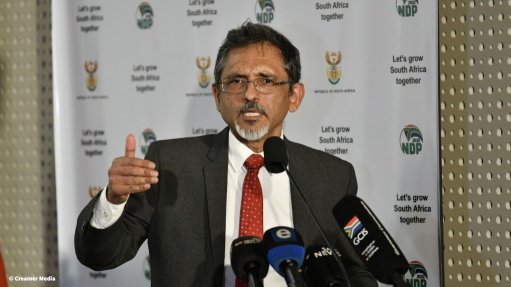
Trade, Industry and Competition Minister Ebrahim Patel
Trade, Industry and Competition Minister Ebrahim Patel outlined firm investment, localisation, export and manufacturing jobs targets in his 2023/24 Budget Vote address to Parliament this week.
In a speech prefaced by what the Minister described as a world in the midst of ‘polycrisis’, or the simultaneous occurrence of several catastrophic events, Patel said his department’s central mission was to build a more resilient economy that was able to grow and transform “despite extraordinary headwinds and challenges”.
The 2023/24 annual performance plan also represented a “step change” by including measurable targets on job creation, investment facilitation, exports and localisation including:
- A new yearly target of facilitating R400-billion in new investment pledges in line with President Cyril Ramaphosa’s goal of securing a further R2-trillion in investment commitments over the coming five-year period;
- a R40-billion localisation target for the year, arising in the form of additional local output and commitments;
- achieving R800-billion in global manufacturing exports, and R8-billion in global business services exports, while exporting at least R330-billion in manufactured goods to other African countries;
- Mobilising R35-billion in incentives to support one-million current workers, while setting a target of 100 000 new jobs, through the social employment fund and in manufacturing and productive services.
Patel also used the speech to confirm the role that the Department of Trade, Industry and Competition would play in tackling intense loadshedding, which posed a threat to growth, employment and manufacturing production.
“We have to put the electricity crisis behind us as quickly as possible,” Patel said, reporting that the R1.3-billion energy resilience fund would be launched by the end of May to support small firms mitigate the impact of load-shedding.
In addition, the department had adopted a “pragmatic” approach to localisation in the electricity sector, which Patel said would be strategically “sequenced” so as to ensure speed in responding to the crisis, while seeking to capture, in time, the industrialisation potential that should arise from the country’s large deployment of renewables and storage.
He also confirmed that a new ‘Energy One-stop Shop’ had been established to assist with speeding up regulatory processes to accelerate private-sector investment in electricity generation.
“But if taken on with focus and vigour, the energy sector provides historic opportunities for a green transition and for an injection of capital and innovation in the economy,” he added, while highlighting the opportunities that could arise in industrial value chains associated with renewables, electric vehicles and green hydrogen.
“To support the transition to electric vehicle manufacturing, considerable technical work is being done and engagements held with National Treasury to expeditiously finalise an affordable and effective strategy; and we are confident we are close to completing that road-map.
“This will be complemented by a new project we are launching next month, to identify opportunities for battery production in South Africa.
“In support of this, we will be working with partners – Finland, the US, China, Belgium, Germany, Zimbabwe, Zambia and the DRC – on battery production value chains.”
In a separate media briefing, Patel acknowledged the risk of publicising the targets, saying that there were many factors, including one outside of the department’s controls, that could result in it falling short.
“But we think being so risk averse . . . does a disservice to South Africans, [particularly] when you have the extent of challenges in the economy that we do, we need government to work in a very different way.
“And so those targets are challenges to all of us to really work differently to get things done much quicker.”